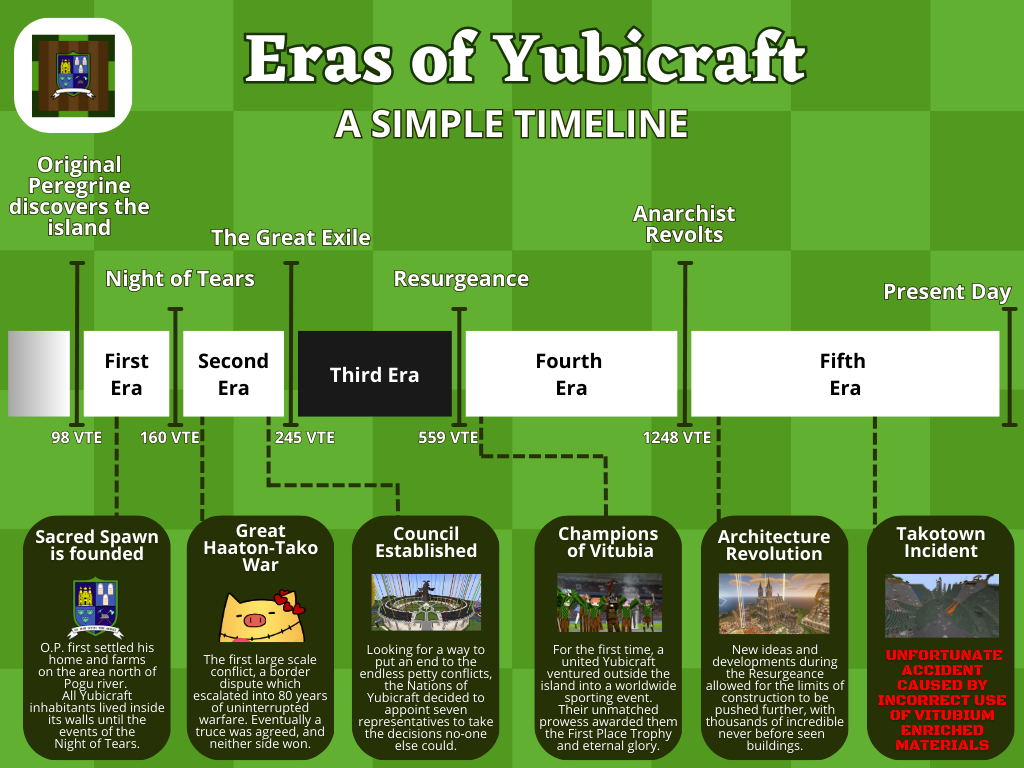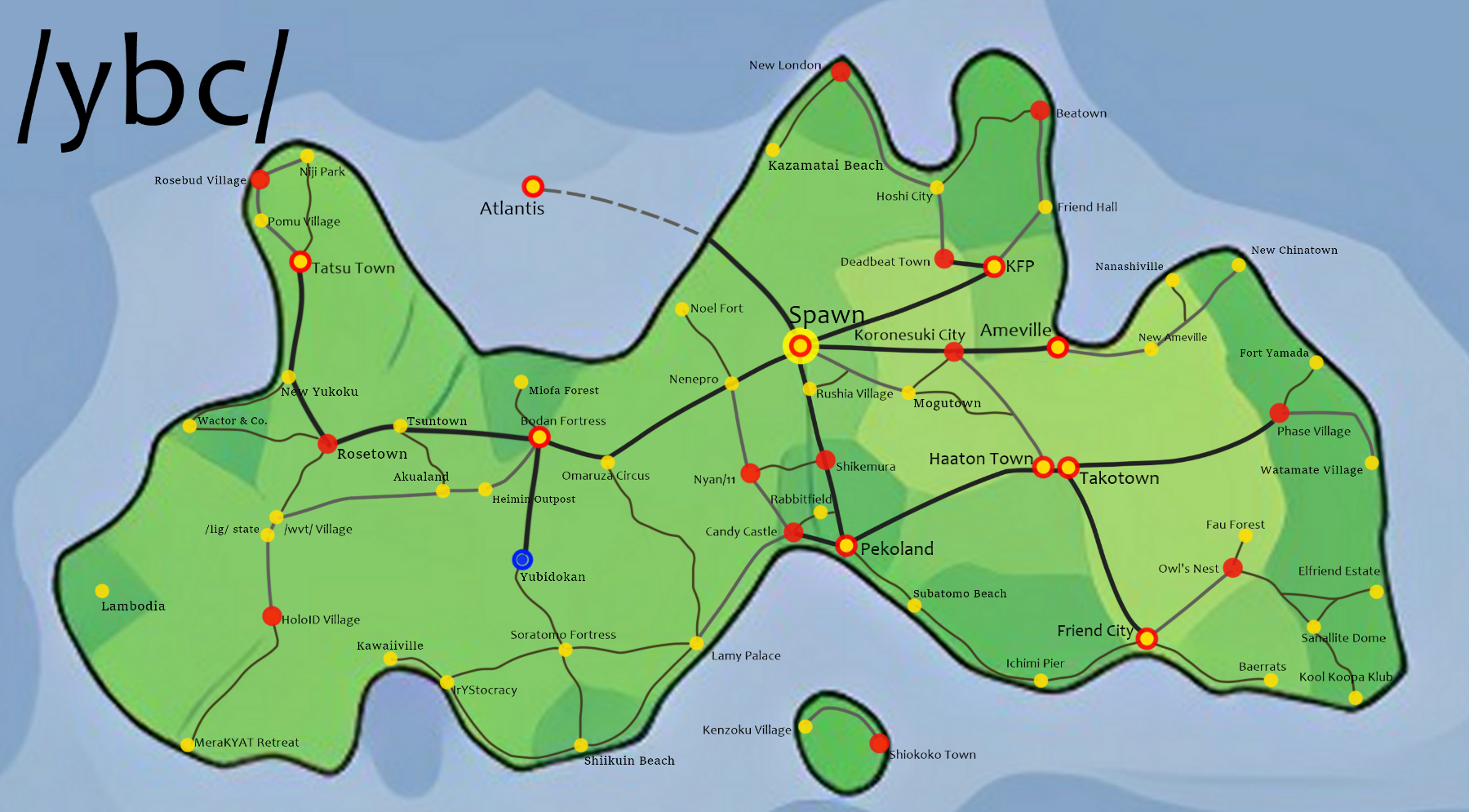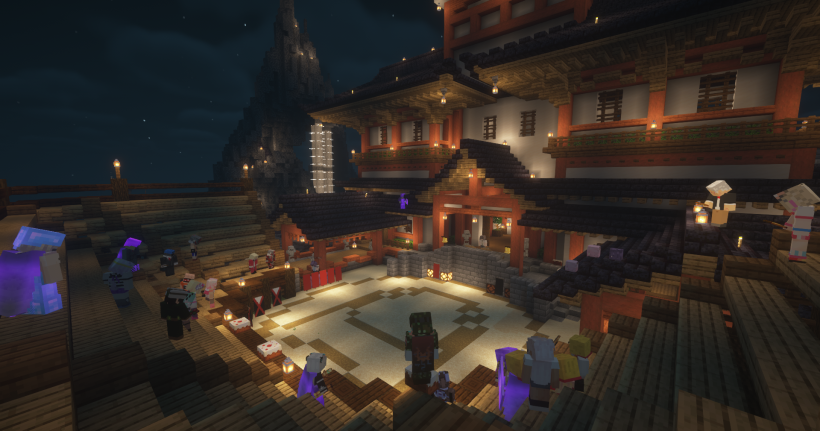Nations of Yubicraft's Lore
"Yubicraft" is the second largest island in Vitubia, domineering over the southwestern waters of the Kizuna Ocean. It's important to note that, despite the territory being named this way, Yubicraft isn't a nation or a state. Rather, this is the blanket term used for the conglomerate of city-states that cover the geography of the island. The inhabitants of Yubicraft may recognize themselves as "Yubicrafters" while also differentiating themselves as a "Nousagi" or "Risuner", and so on.
History

The First Era
While the context changes between the different Yubicrafter historians, the general consensus is that the discoverer and founder of Yubicraft was a thief. While his real name was lost to time, he's called "Original Peregrine" by the locals, and likely was a known criminal Onigirya on the run, who had recently commited a big hit and was hoping to hide his ill-gotten wealth on the, at the time, unexplored lands of the southern hemisphere. Details are unclear on what exactly happened once he reached the island, but some religious texts imply he had a close encounter with one of the Goddesses (which one exactly is a very hotly debated point of discussion).
This encounter must have had a serious effect on his plans, as, just a few months later, he returned of his own will to /hlgg/, and gathered resources for a full on expedition with settlers. Thus, he founded the Sacred Spawn, a simple but thriving town in the heart of the island.
The settlers that followed Original Peregrine soon began suffering intense experiences related to their beliefs, dreams of impossible architecture and voices in the night telling them what to do. Little did they know, this island was a hotspot of Divine activity, a gateway for the Goddesses to interact and enter our world, if so they choosed.
The Second Era
Sacred Spawn grew in size and conflicts soon arose. There simply wasn't a consensus of which Goddesses was responsible for the oddities at hand, and sacrifices and offerings were constantly disputed. Ultimately, those who followed the same Goddess ended up leaving in groups from Sacred Spawn, and funded their own villages on the island dedicated excusively to their oshi. Most of these communities were peacefuland simply wanted to be left alone, but conflict was sure to boil between those that were simply to close. Such was the case with Haatons and Takodachis, who settled right next to each other and claimed to have the right to expand into the opposing territory. The Great Haaton-Tako war was just one, albeit the bloodiest, of many long standing conflicts, which eventually necesitated the intervention of the other City-States in order to avoid a full blown collapse.
This is when the Sacred Spawn Council was created, where a representative of each City-State would take decisions on large scale issues. This Council however did not rule over anyone, it simply established accords between the inhabitants.
The Third Era
Most details are lost. What is known is that, at some point, Yubicraft simply vanished. There is no written history on this, observers weren't nearby and religious texts simply do not talk about it. For all intents and purposes, the island dissappeared for over 300 years in what is now called The Great Exile.
Archeology on the site has yielded no results, except the discovery of an extremely dense concentration of chuubanite, in a single layer about 15 meters thick that expands 35 meters below the entire island. It remains the greatest mistery of /ybc/'s culture.
The Fourth Era
Just as it dissappeared, Yubicraft reappeared. However, their inhabitants had changed. Be it due to the chuubanite exposure or whatever happened in those 200 years, they now had superhuman traits that allowed them to be capable of incredible feats. This was especially evident when soon after, the first worldwide sport event was held, and they easily overperformed every other team thus winning the first place trophy.
This public display of prowess was the first time Vitubia had any real contact with these people as a single entity and not just dissasociated religious groups. And so they decided to name themselves "Yubicrafters" for the first time.
Many citizens of continental nations opted to take the plunge and join the different city-states to worship the Goddesses and hopefully attain the same characteristics of longstanding inhabitants of the island, creating a spike in population like never before seen. This is known as The Resurgeance, starting a long era of thriving activity.
Now
The City States are in a stable, peaceful relationship. Goddesses occasionally visit the land, and/or influence it in some way or another.
Monuments cover the geography, and Sacred Spawn is deserted, simply remaining as a legendary place for the Council and events to happen.
It's the Fifth Era, long live Yubicraft.
Geography

The island consists mostly of large grassy plains, a slightly ondulating terrain crossed by hills and the very ocassional eroded ridges on the eastern side that barely surpass 500 meters.
It experiences 4 complete seasons, with spring being particularly rainy, which is fantastic for crop production and general farming. Despite this, less than 1% of Yubicraft's terrain has been farmed, since the demand for food is not as intense thanks to the low density of population.
The northern coast consists of clow cliffs that break into the ocean, while southern shores are large, expansive fine sand beaches occassionally interrupted by ancient basaltic rocks.
The entire island is extremely old geology wise as evidence by the high levels of long term erosion, which has leveled the surface to its current slightly hilly state, while also filling the depths with rich ore veins and deep cave systems. It's very likely that the entire island was once connected to the fetish continent, but the rising sea level covered the isthmus or rather continental drift pulled them apart.
There's a significantly smaller island in the south, which is currently settled as well.
The City States are fairly separated between them except for a few cases where communities decided to cooperate, or where border conflicts led to an exaggerated development towards the opposing side to claim rights.
There are also several villages administrated by these City States, such as Rabbiton or New Ameville.
Sacred Spawn acts as the Administrative Capital, despite not being a real City-State or having any direct influence over lawmaking or enforcing on other City-States.
Culture

It's key to understand /ybc/'s culture that, above all, Yubicraft isn't a nation and the inhabitants of the island don't see each other as countrymen. They are first and foremost loyal to their City State, which just so happens to be located on an island named Yubicraft. There is a certain feeling of "Belonging" to the land which is shared between the City States, and they will unite if the occasion requires it against a common threat, but there isn't a single "Yubicrafter" identity beyond shared abilities and interests.
That said, these City-States aren't enclaves from related nations. They are fully independent with their own culture, which may be heavily influenced by their origins, but it's still centered on their religion and Yubicrafter customs.
This means competition and gathering events are extremely popular in Yubicraft and celebrated each year without skips, a few examples being Speed King (a wooden boat race event), Mr Koro's Bloodsport (a hand to hand fighting tournament) and the most important of all, The Yubilympics.
These events are the core of Yubicrafter identity, the people celebrating their different oshis in ways that will hopefully make them proud on peaceful terms.
It should go without saying, but Yubicrafters are all extremely religious and devout, pleasing their Goddesses is priority number one at all times. Each City State is dedicated to one or a group of related divinities, and it's expected of the citizens to travel to the correct City should they want to worship someone else. This is not enforced by law, but it is seen as the respectful thing to do.
Because Yubicraft is constantly visited by divinities and other entities that enter Vitubia, it's believed to be a Holy Place and that makes their inhabitants fairly distrusting and low tolerance regarding outsiders. They will offer hospitality, but at the minimum sign of disrespect or treachery they will respond with violence and be fully supported by their people.
There is no organized military force in any city-state (with the exception of Owl's Nest, the hooman province) or law enforcement. Instead, every individual has the full right to stop, arrest and even kill those perpetrating a crime. This may seem like an easily exploitable outllook, but the fear of divine punishment for a wrongful judgement keeps people in check. Every action taken must be fair and just in the Holy Land, or you wil lose the favour of your Goddess and may be expelled of their City State.
Despite this self policing, Yubicraft does have a general court of law for large issues, usually those happening between city states. It's presided by representatives of every city not involved in the conflict, and it works on the assurance that these cities will keep each other in check.
There's also a Councilthat takes place in Sacred Spawn to decide matters that involve the entirety of Yubicraft, in which every representative would have conducted a previous election on their City-State, and simply presents the results.